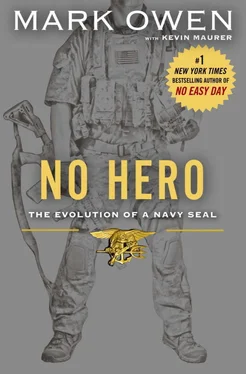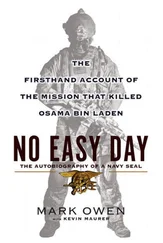The patrol back to the landing zone went by faster. Everyone in the Taliban-controlled valley was up now, and we didn’t want to stay around any longer than we had to. It was only a matter of time before more fighters came out to avenge their dead friends.
It was still very cold out and we were all sweaty from the firefight. My shirt was soaked and my pants clung to my skin. The difference was for the patrol out of the valley, my mind was on the fact that we’d successfully eliminated the entire Taliban element. They would never harm any American service members again.
I slid my winter gloves on and pulled my beanie down over my ears before replacing my helmet on my head. When the troop chief gave the order to move, we moved out without a word. I kept putting one foot in front of the other, thinking about the warm shower back at the base. I hoped the showers still had hot water.
The mission doesn’t always wait for sunny, seventy-two-degree days. Whether the objective is in waist-deep snow, the middle of the shark-infested Indian Ocean, or up a goat trail in the highest peaks of Afghanistan, we are trained to stay focused and complete the mission. We don’t need comfort to be effective.
BUD/S seems sadistic to outsiders, but it is where we start to condition ourselves to not only get comfortable with discomfort, but also embrace it. On Friday evenings the instructors lined us up on the sand at the edge of the water.
“Everyone wants to be a SEAL on Friday,” the instructor would yell. “It’s Friday and you’re all going to have the weekend off. You’re going to hit the bars and relax. The question is, which one of you wants to be a SEAL when the conditions are shitty? Which one wants it when you’re wet, tired, cold, and miserable and you still have to complete your mission?”
No one spoke. No one smiled. We just wanted to go for the weekend.
“Look to your left and right,” the instructors would say. “Will they be there when the going gets tough?”
The whole time the instructors kept walking the line.
“The only easy day was yesterday, gentlemen. You think about that this weekend, and when you start training again on Monday, just know that it’s going to suck much worse than it did today.” I can honestly say, I’ve been colder and more miserable than any situation they put us in during BUDs. The saying holds true: “The only easy day was yesterday.”

CHAPTER 11
Watch the Shoes
Evolution
I gotthe page early in the morning.
Team leaders in the squadron always carry small black pagers on deployment so planners can alert us of a possible mission. I rolled out of my lumpy bed, which was built into the wooden walls of my room, and headed over to the operations center.
We were on vampire hours, so while to us it was early morning, really it was a late winter afternoon in Afghanistan. We slept all day and ran missions at night. Things were slow. We’d been at a base south of Kabul for months, with few missions. The bitter cold made the winter fighting season slow. The Taliban were across the border in Pakistan or lying low in Afghanistan. Neither side really wanted to fight.
I stuffed my hands into my jacket as I walked over to the operations center. I had no idea what was going on, and I didn’t wake my team. We’d been conducting missions like this for years now, and I knew things could spin down as quickly as they had spun up. Many times we would wake everyone up to start planning and the target would disappear. It was better that they get as much sleep as possible.
I walked into the operations center. It was a squat, prefab building. The floors were muddy from all the dirt tracked in by our boots. There was a worn path from the door to the coffee maker. I followed the track and got a hot cup. I took two quick sips and let the caffeine shake me from my funk.
There was a subdued energy in the room as the planners and intelligence analysts pored over data, trying to tee up that night’s mission. Black-and-white Predator feeds trained on a compound were displayed on the screen. Standing near the back next to a long desk were the troop chief and troop commander. They saw me come in and nodded. I dropped three packets of sugar into my coffee and joined them.
“What’s up?” I said.
“ISR has been tracking some fighters,” the troop chief said.
The drones patrolling overhead caught a group of five to seven fighters going from compound to compound, looking for a warm bed and meal. They’d been moving most of the day but had just stopped. The planners figured the group was going to stop moving and bed down at the compound for the night. It was starting to get dark and they’d been traveling most of the day.
“From what we can see from the ISR, it looks like they were just walking through town and decided to hide out at this random house for the night,” the troop chief said. “We saw them knock on the door and when the people inside answered they pushed through the door. They even moved their vehicles inside the compound’s wall.”
I was one of three team leaders. I looked over at Steve as the troop chief gave us details on the compound’s location. Steve was nodding as the troop chief told us about the mission.
After the first briefing, the recce team leader started working up routes to the house. I started looking at the house with Steve.
“Looks pretty cut-and-dry to me,” I said.
“I agree. You going to wake up your crew?” Steve said.
“Yep, I’ll wake them up now so they can grab some food before we start spinning too hard,” I said.
I followed the muddy path to the door and made a beeline to where the guys were sleeping. The tent was pitch-black. Only a small strip of white rope lighting ran down the hallway toward our makeshift lounge area. The plywood walls separated the tent into little mini-rooms, each with a bed and desk. Each room had one SEAL. It was tight quarters, but at least you had some privacy.
The far end of the tent was the lounge. It was spacious, with stadium seating in front of a fifty-inch flat screen. We’d been coming to Shank for years, and each squadron worked hard to make the living conditions a little better each time. A previous squadron built a fire pit and outdoor lounge. Another fixed up the gym. If we had to do time in Afghanistan, the goal was to make it as nice as possible.
I turned on the light in the lounge and turned the TV on. We could watch the American Forces Network, which broadcast American shows, movies, and sports. But we’d also rigged it to show the same ISR feed that the planners saw in the operations center. I turned on the feed. All around me, I could hear the boys stirring. Guys were getting out of their bunks.
I put on a pot of coffee. One by one, with a fresh cup in their hands, the guys gathered around the TV. There was nothing to see other than the compound walls and buildings. There was no movement inside the walls or near the compound because the fighters had already moved inside the buildings.
“Sweet,” Walt said. “Same shit, different day.”
He rubbed his eyes and watched the black-and-white picture for a few seconds.
“This better not be another dry hole. I don’t go out in these temperatures for less than twenty bad guys,” Walt said in his typical smartass tone.
Once all the guys got a cup of coffee or a drink, I started the brief. I gave them the rundown on the target and the fighters. There was nothing difficult about this hit. We’d rolled up fighters sleeping in compounds just like this hundreds of times before. In many ways this mission was just plug-and-play. Everyone knew what roles needed to be filled.
Читать дальше











